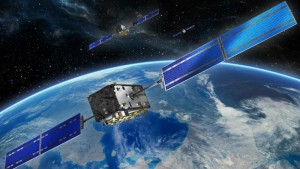
Tag Archives: European GNSS Agency
GNSS for autonomous vehicles
Speaking at a session completely dedicated to autonomous vehicles, GSA Head of Market Development Gian-Gherardo Calini said that accurate and reliable positioning information is a clear enabler for autonomous vehicles. “With its dual frequencies, better reliability and ability to cope with multi-path characteristics in urban environments, Galileo could be a big differentiator in this potentially huge market,” he said.
However, implementing the technologies is challenging. For example, according to Centro Ricerche Fiat Programme Manager Luisa Andreone, the higher you moved up the automation levels in vehicles, the more accurate the positioning requirements are. Other key elements are signal availability, integrity, affordability and regulations. Read more…
PRS, diamond service
One area where Galileo is likely to have maximum impact is the Public Regulated Service (PRS). The PRS will provide a robust and encrypted positioning and timing capability restricted to governmental authorised users. Speaking at the event, DG Growth Head of Unit, Galileo Directorate Philippe Jean described the service and the access control mechanisms that will minimise interfering threats and so offer continuity of service in times of crisis. “The PRS signal structure has better resilience to jamming and interference,” he said. Jean also said that the Member States and the Commission are considering how to allow secure access to PRS by third-party countries.
“Active contributions from all the different stakeholders involved in PRS is required to ensure delivery of service to authorised users,” added GSA PRS Officer Marco Detratti. “Competent PRS authorities (CPAs) are being established at the national level, but to build trust, the system and equipment must deliver a truly robust service that grants unlimited and uninterrupted access worldwide.” Read more…
GNSS timing service
The timing services supplied by GNSS are an increasingly important, but often unrecognised, part of today’s modern infrastructure. This is because the vital role of space-based timing is only exposed when it fails. To shed some light on just how important these services are, this year the Munich Satellite Summit’s legal session focused on the timing aspects of GNSS.
“Many sophisticated timing applications rely on GNSS signals,” said BHO legal partner Dr Oliver Heinrich. “However, they tend to be taken for granted and are only noticed when things go wrong, such as what happened on 26 January when a software upload to GPS satellites induced a 13 millisecond misalignment – a small difference that had a big global impact. Read more…
EU must ensure greater use of Galileo
Written by Carlo des Dorides.

Despite this recognised potential, we struggle to adequately support innovation. If Europe wants to remain a global leader in space, it must become more competitive today. We cannot afford to rest on our past successes.
The European GNSS Agency (GSA) actively funds innovation through EU programmes such as Horizon 2020. These initiatives that aim to keep space accessible and safe in the long run, have already made a difference. Read more…
EGNOS protects GNSS timing
The European GNSS Agency (GSA) announces that the EGNOS time service remained stable and properly synchronised to UTC time during a recent GPS timing anomaly on January 26th.
On the 26th of January, users of United States GPS system experienced timing issues after a number of GPS satellites broadcast incorrect UTC correction parameters. According to the US Air Force, the coordinated universal time message that was transmitted was off by 13 microseconds. During this anomaly EGNOS, which serves as an augmentation to the GPS, remained stable and properly synchronised to UTC. Read more…
Galileo Ionospheric Model for Single Frequency Users
The GSA has published a new document on the NeQuick Ionospheric Model, used to compensate ionospheric errors on Galileo and other GNSS signals. The document is titled “European GNSS (Galileo) Open Service Ionospheric Correction Algorithm for Galileo Single Frequency Users”. Read more…
